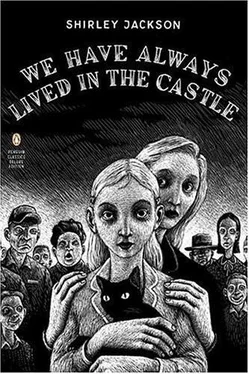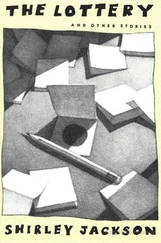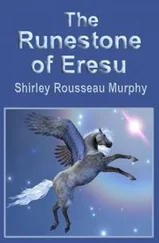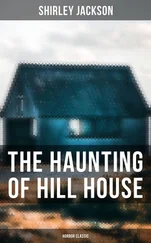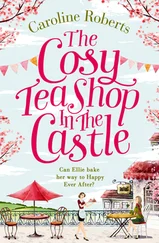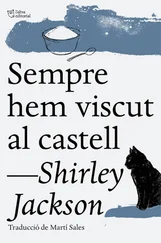Shirley Jackson - We Have Always Lived in the Castle
Здесь есть возможность читать онлайн «Shirley Jackson - We Have Always Lived in the Castle» весь текст электронной книги совершенно бесплатно (целиком полную версию без сокращений). В некоторых случаях можно слушать аудио, скачать через торрент в формате fb2 и присутствует краткое содержание. Город: New York, Год выпуска: 2006, ISBN: 2006, Издательство: Penguin Books, Жанр: Триллер, gothic_novel, на английском языке. Описание произведения, (предисловие) а так же отзывы посетителей доступны на портале библиотеки ЛибКат.
- Название:We Have Always Lived in the Castle
- Автор:
- Издательство:Penguin Books
- Жанр:
- Год:2006
- Город:New York
- ISBN:978-1-101-53065-8
- Рейтинг книги:3 / 5. Голосов: 1
-
Избранное:Добавить в избранное
- Отзывы:
-
Ваша оценка:
- 60
- 1
- 2
- 3
- 4
- 5
We Have Always Lived in the Castle: краткое содержание, описание и аннотация
Предлагаем к чтению аннотацию, описание, краткое содержание или предисловие (зависит от того, что написал сам автор книги «We Have Always Lived in the Castle»). Если вы не нашли необходимую информацию о книге — напишите в комментариях, мы постараемся отыскать её.
is a deliciously unsettling novel about a perverse, isolated, and possibly murderous family and the struggle that ensues when a cousin arrives at their estate.
We Have Always Lived in the Castle — читать онлайн бесплатно полную книгу (весь текст) целиком
Ниже представлен текст книги, разбитый по страницам. Система сохранения места последней прочитанной страницы, позволяет с удобством читать онлайн бесплатно книгу «We Have Always Lived in the Castle», без необходимости каждый раз заново искать на чём Вы остановились. Поставьте закладку, и сможете в любой момент перейти на страницу, на которой закончили чтение.
Интервал:
Закладка:
I was still and cold, looking at her and remembering.
“I was very wicked,” she said. “I never should have reminded you of why they all died.”
“Then don’t remind me now.” I could not move my hand to reach over and take hers.
“I wanted you to forget about it. I never wanted to speak about it, ever, and I’m sorry I did.”
“I put it in the sugar.”
“I know. I knew then.”
“You never used sugar.”
“No.”
“So I put it in the sugar.”
Constance sighed. “Merricat,” she said, “we’ll never talk about it again. Never.”
I was chilled, but she smiled at me kindly and it was all right.
“I love you, Constance,” I said.
“And I love you, my Merricat.”
Jonas sat on the floor and slept on the floor and I thought it ought not to be so difficult for me. Constance should have had leaves and soft moss under her blanket but we could not dirty the kitchen floor again. I put my blanket in the corner near my stool because it was the place I knew best, and Jonas got up onto the stool and sat there, looking down on me. Constance lay on the floor near the stove; it was dark, but I could see the paleness of her face across the kitchen. “Are you comfortable?” I asked her, and she laughed.
“I’ve spent a lot of time in this kitchen,” she said, “but I never before tried lying on its floor. I’ve taken such good care of it that it has to make me welcome, I think.”
“Tomorrow we bring in lettuce.”
10
Slowly the pattern of our days grew, and shaped itself into a happy life. In the mornings when I awakened I would go at once down the hall to make sure the front door was locked. We were most active in the very early morning because no one was ever around. We had not realized that, with the gates opened and the path exposed to public use, the children would come; one morning I stood beside the front door, looking out through the narrow pane of glass, and saw children playing on our front lawn. Perhaps the parents had sent them to explore the way and make sure it was navigable, or perhaps children can never resist playing anywhere; they seemed a little uneasy playing in front of our house, and their voices were subdued. I thought that perhaps they were only pretending to play, because they were children and were supposed to play, but perhaps they were actually sent here to look for us, thinly disguised as children. They were not really convincing, I decided as I watched them; they moved gracelessly, and never once glanced, that I could see, at our house. I wondered how soon they would creep onto the porch, and press their small faces against the shutters, trying to see through cracks. Constance came up behind me and looked out over my shoulder. “They are the children of the strangers,” I told her. “They have no faces.”
“They have eyes.”
“Pretend they are birds. They can’t see us. They don’t know it yet, they don’t want to believe it, but they won’t ever see us again.”
“I suppose that now they’ve come once, they’ll come again.”
“All the strangers will come, but they can’t see inside. And now may I please have my breakfast?”
The kitchen was always dark in the mornings until I unbolted the kitchen door and opened it to let the sunlight in. Then Jonas went to sit on the step and bathe and Constance sang while she made our breakfast. After breakfast I sat on the step with Jonas while Constance washed the kitchen.
Barricading the sides of the house had been easier than I expected; I managed it in one night with Constance holding a flashlight for me. At either side of our house there was a spot where the trees and bushes grew close to the house, sheltering the back and narrowing the path which was the only way around. I brought piece after piece from the pile of junk Mr. Harler had made on our front porch, and heaped the broken boards and furniture across the narrowest spot. It would not really keep anyone out, of course; the children could climb over it easily, but if anyone did try to get past there would be enough noise and falling of broken boards to give us plenty of time to close and bolt the kitchen door. I had found some boards around the tool shed, and nailed them rudely across the glass of the kitchen door, but I disliked putting them across the sides of the house as a barricade, where anyone might see them and know how clumsily I built. Perhaps, I told myself, I might try my hand at mending the broken step.
“What are you laughing about now?” Constance asked me.
“I am thinking that we are on the moon, but it is not quite as I supposed it would be.”
“It is a very happy place, though.” Constance was bringing breakfast to the table: scrambled eggs and toasted biscuits and blackberry jam she had made some golden summer. “We ought to bring in as much food as we can,” she said. “I don’t like to think of the garden waiting there for us to come and gather growing things. And I’d feel much better if we had more food put securely away in the house.”
“I will go on my winged horse and bring you cinnamon and thyme, emeralds and clove, cloth of gold and cabbages.”
“And rhubarb.”
We were able to leave the kitchen door open when we went down to the vegetable garden, because we could see clearly whether anyone was approaching my barricades and run back to the house if we needed to. I carried the basket and we brought back lettuce, still grey with ash, and radishes, and tomatoes and cucumbers and, later, berries, and melons. Usually I ate fruit and vegetables still moist from the ground and the air, but I disliked eating anything while it was still dirty with the ash from our burned house. Most of the dirt and the soot had blown away and the air around the garden was fresh and clean, but the smoke was in the ground and I thought it would always be there.
As soon as we were safely settled Constance had opened Uncle Julian’s room and cleaned it. She brought out the sheets from Uncle Julian’s bed, and the blankets, and washed them in the kitchen sink and set them outside to dry in the sunlight. “What are you going to do with Uncle Julian’s papers?” I asked her, and she rested her hands against the edge of the sink, hesitating.
“I suppose I’ll keep them all in the box,” she said at last. “I suppose I’ll put the box down in the cellar.”
“And preserve it?”
“And preserve it. He would like to think that his papers were treated respectfully. And I would not want Uncle Julian to suspect that his papers were not preserved.”
“I had better go and see that the front door is locked.”
The children were often outside on our front lawn, playing their still games and not looking at our house, moving awkwardly in little dashing runs, and slapping one another without cause. Whenever I checked to make sure that the front door was locked I looked out to see if the children were there. Very often I saw people walking on our path now, using it to go from one place to another, and putting their feet down where once only my feet had gone; I thought they used the path without wanting to, as though each of them had to travel it once to show that it could be done, but I thought that only a few, the defiant hating ones, came by more than once.
I dreamed away the long afternoon while Constance cleaned Uncle Julian’s room; I sat on the doorsill with Jonas asleep beside me, and looked out on the quiet safe garden.
“Look, Merricat,” Constance said, coming to me with an armful of clothes, “look, Uncle Julian had two suits, and a topcoat and a hat.”
“He walked upright once; he told us so himself.”
“I can just barely remember him, years ago, going off one day to buy a suit, and I suppose it was one of these suits he bought; they are neither of them much worn.”
Читать дальшеИнтервал:
Закладка:
Похожие книги на «We Have Always Lived in the Castle»
Представляем Вашему вниманию похожие книги на «We Have Always Lived in the Castle» списком для выбора. Мы отобрали схожую по названию и смыслу литературу в надежде предоставить читателям больше вариантов отыскать новые, интересные, ещё непрочитанные произведения.
Обсуждение, отзывы о книге «We Have Always Lived in the Castle» и просто собственные мнения читателей. Оставьте ваши комментарии, напишите, что Вы думаете о произведении, его смысле или главных героях. Укажите что конкретно понравилось, а что нет, и почему Вы так считаете.
